Iran Won't Recognize Israel Even With Palestinian State - Former FM
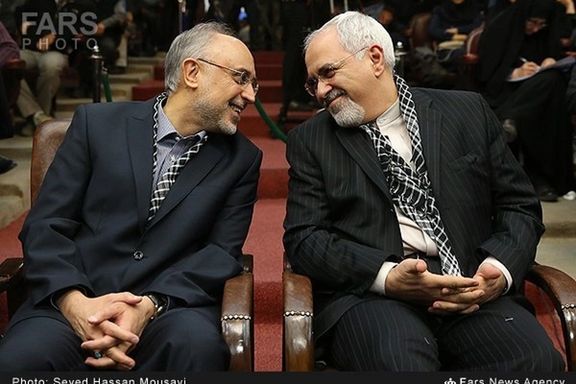
Iran’s former foreign minister Ali Akbar Salehi stressed that Tehran will “never” recognize Israel “even if a Palestinian state is established.”

Iran’s former foreign minister Ali Akbar Salehi stressed that Tehran will “never” recognize Israel “even if a Palestinian state is established.”
“As long as the [Israeli] entity exists and is active in our region, the crisis will remain between Iran and the regime that is occupying Jerusalem, even if a Palestinian state is established. I am referring to the proposed two-state solution,” Salehi said in an interview with Russia Today.
The Iran-Israel conflict will end only when the latter “ceases to exist,” he pointed out, further noting that “the form and means of this confrontation may change, according to the circumstances of time and place.”
The two-state solution to the Israeli–Palestinian conflict envisions an independent State of Palestine alongside the State of Israel, west of the Jordan River.
The boundary between the two states is still subject to dispute and negotiation, with Palestinian and Arab leadership demanding full Israeli withdrawal from territories it occupied in 1967, which is rejected by Israel.
In 2015, Supreme Leader Ali Khamenei said Israel must be destroyed in 25 years and the government even set up a countdown clock in Tehran and a few other cities. Many Iranians mock the anti-Israel rhetoric and the ticking clock, but the regime is adamant in pursuing the goal.
Regime authorities use every opportunity to stress the necessity of “Israel's destruction,” a slogan that has justified Iran’s huge financial and military support to militant groups such as Hamas and Hezbollah, while Iranians increasingly face poverty and a bleak economic future.

Yemen’s Houthis launched a missile attack against the USS Carney, an Arleigh Burke-class guided missile destroyer, in the Gulf of Aden.
The US Central Command (CENTCOM) announced in a post on X that the Iran-backed militant group fired an anti-ship missile to target the warship at 1:30 p.m. (Sanaa time) on January 26.
The USS Carney intercepted and shot down the projectile, CENTCOM reported, further adding that the infrastructure and the forces sustained no damage or injury in the attack.
Though the Iranian regime has avoided any direct involvement in the Gaza war, Tehran has used its proxy groups in the region such as Houthis and Hezbollah to attack Israeli and American targets.
Yemen’s Houthis in particular, have disrupted regional stability and international trade by targeting shipping lanes in the Red Sea, the Gulf of Aden, and the Bab el-Mandeb Strait.
The group claims they only target Israeli and Israel-bound ships. Their campaign began after Iran’s Supreme Leader Ali Khamenei in early November urged Muslims to initiate a blockade of Israel.
Citing regional and Iranian sources, Reuters reported last week that commanders from Iran’s IRGC and Lebanon’s Hezbollah are in Yemen helping to direct Houthis’ attacks in the Red Sea.
In December, the United States launched a multinational naval coalition in the Red Sea to protect trade vessels. According to Reuters, 20 countries, including Britain, Norway, Seychelles, France, the Netherlands, Australia and Italy, have joined the coalition.
On January 10, the UN Security Council passed a resolution, calling on the Houthis to stop attacks on shipping immediately.
Two days after the resolution was approved, the US and UK targeted dozens of Houthis’ sites in Yemen.
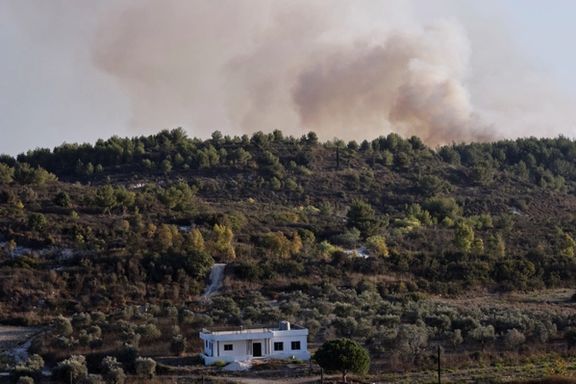
Israel has allegedly struck a major Iranian-Hezbollah airport in Qalaat Jabbour in southern Lebanon.
According to a Jerusalem Post report, the airport was used by the militant group to launch aerial raids against Israeli territory.
Referring to the airport, Israel Defense Minister Yoav Gallant said in September that the Iranian flag was raised there just 20 kilometers away from the Israeli border.
“Put differently, the land is Lebanese; the control is Iranian; the target is Israel,” he pointed out.
Though the Iranian regime has avoided any direct involvement in the Gaza war, Tehran has used its proxy groups in the region such as Houthis and Hezbollah to attack Israeli and American targets.
Following the targeted killing of Saleh al-Arouri, a top Hamas leader, by Israel in Beirut’s Hezbollah-controlled southern suburbs on January 2, the tensions have escalated along Lebanon-Israel border. However, the two sides have avoided an all-out military confrontation.
Following Hamas’ October 7 attack on Israel, many expected a full-fledged war to erupt also against Hezbollah, but the Iranian-backed force has limited its involvement to border skirmishes with Israel.
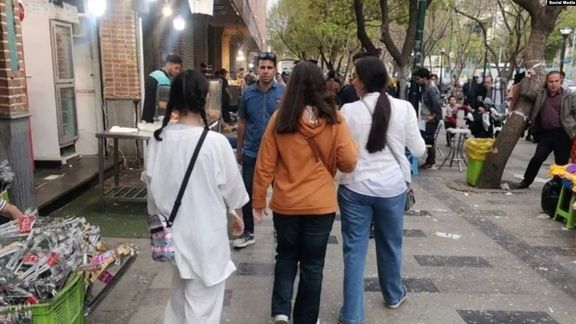
Iran's Chief Justice has ordered prosecutors to take "decisive" action against those who are allegedly encouraging defiance of hijab rules in an "organized manner."
Gholamreza Mohseni-Ejei directed prosecutors this week to act in the name of the public and identify those "organized and foreign-affiliated elements" who oppose hijab rules. They are to be put on trial and punished within the framework of the law with the assistance of law enforcement.
This directive suggests a shift in focus from merely not wearing hijab to charging individuals involved in "organized" opposition to hijab with offenses such as "collusion and assembly to act against national security." In recent years, anti-compulsory hijab activists have faced fabricated charges, with some sentenced to prison, like Vida Movahed, who received a one-year sentence for her protest against mandatory hijab in 2017.
The 32-year-old woman had climbed a utility box in a busy Tehran Street, removed her headscarf, tied it to a stick and silently waved it in protest to mandatory hijab in Iran in 2017.
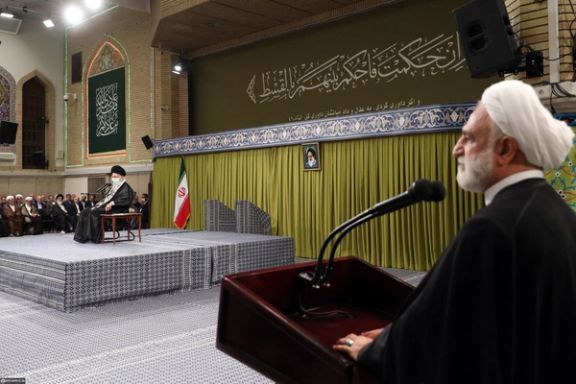
Mohseni-Ejei emphasized the Islamic principle of "amr-e be marouf va nahy az monkar," which urges Muslims to encourage good deeds and discourage forbidden ones. However, he noted that not all problems can be solved through preaching and called for legal action against those with ties to foreign countries who resist Iran's values and security.
“People who have ties to foreign [countries] and intend to resist the people's values, their chastity, and [harm] their psychological and physical security should be dealt with the sword of justice,” he said.
Iranian authorities often use the tactic of accusing dissidents of having ties to foreigners, in order to charge them with security crimes, rather than just political offences.
In recent years, many Iranian women have protested mandatory hijab, leading to arrests and imprisonment. Authorities have also impounded thousands of cars and closed businesses for failing to enforce hijab rules.
A police official in the religious city of Qom, where most of Iran's Shiite seminaries are located, said last week that in the past ten months owners of 74,000 cars had received warnings for hijab violations with nearly 20,000 impounded and nearly 2,000 cases referred to courts.
These numbers showed a six-fold increase in comparison to the same period last year, he said.
This move by the chief justice appears to address criticism from high-ranking clerics and seminary teachers who have expressed concerns about the perceived weakening of hijab enforcement. Grand Ayatollah Hossein Nouri-Hamedani and a group of seminary teachers in Qom have called for stronger measures to address defiance of hijab rules, expressing fears that it could lead to "extensive immorality" and harm the country's independence.
In a letter addressed to the president, chief justice, and parliament speaker earlier this week, one hundred teachers of Qom seminaries demanded decisiveness in dealing with what they called the “phenomenon” of defiance of hijab.
The signatories of the letter insisted on enforcing Islamic rules and alleged that the refusal of women to abide by mandatory hijab rules could be used by “enemies” and “feminists”.
“Enforcement of the law and prevention of [moral] corruption, of course, entails costs which we have to pay if we want to implement Islam,” they wrote.
“One hundred have written a petition to the heads of the state under the name of seminarians and complained about everything, from cinema and women's sports to hijab, but said nothing about inflation, the state of people’s livelihood, and the country's economy!” dissident journalist Saeed Maleki tweeted, suggesting that after the upcoming elections authorities will be taking tougher measures to address the concerns of these clerics.
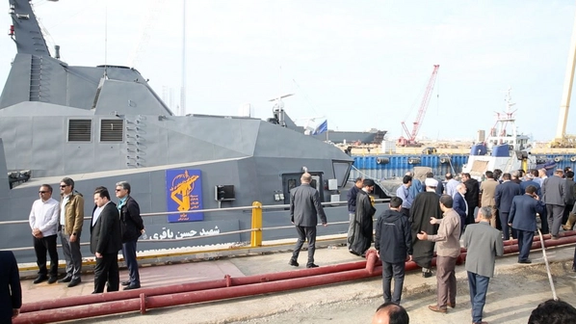
Amid international concerns about the proliferation of Iranian drones, the Islamic Republic is scaling up, including supplying Sudan and launching drone carriers.
Maritime news website Splash247 reported this week that Iran is readying to launch its first drone carrier, the Shahid Bagheri, a converted boxship -- previously called Sarvin -- that has undergone modifications to accommodate a large fleet of long-range drones.
Exclusive Planet Labs satellite images obtained by Splash, following an investigation by TankerTrackers.com, revealed how the 3,280 TEU (twenty-foot equivalent unit) boxship delivered from Hyundai Heavy Industries in the year 2000 went through the reconfiguration at a shipyard west of Bandar Abbas in southern Iran.
The Shahid Bagheri, now controlled by Iran’s Revolutionary Guards, has added width to its deck and has around 170 meters (about 558 ft) of runway. It can now accommodate the departure and landing of a very large fleet of fixed-wing drones, adding to merchant shipping’s long list of concerns surrounding the security situation in the Middle East.
“We anticipate Iran’s coming drone carrier will eventually wreak havoc against commercial vessels in the Arabian Sea, somewhere halfway to India,” TankerTrackers CEO Samir Madani told Splash.
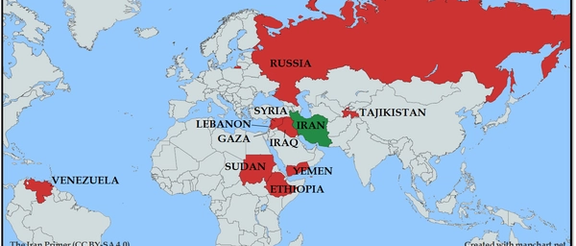
Iran's foray into drone carrier technology comes as the Islamic Republic has been assisting the Houthis in Yemen in their targeting of merchant vessels since November. Around 35 merchant ships have been targeted by dozens of drones and missiles. One car carrier, the Galaxy Leader, was hijacked, along with 25 crew members.
The Iran-backed Houthis say the campaign aim is to force Israel to end its offensive in Gaza, which followed the October 7 invasion of Israel, when Hamas, another Iran-backed militia, killed 1,200 mostly civilians and took hundreds of hostages.
Vice Admiral Brad Cooper, the head of the US Navy’s 5th Fleet, in charge of operations in the Middle East, said, “What I’ll say is Iran is clearly funding, they’re resourcing, they are supplying and they’re providing training. They’re obviously very directly involved. There’s no secret there.”
While the world seems united to bring back security to the Red Sea shipping, with the US leading a large naval coalition there and China calling on Tehran to rein in its Yemeni proxy, the Islamic Republic has been supplying combat drones to Sudan, which has a 700-kilometer Red Sea coastline.
Through supplying Sudan’s army, Iran is taking sides in a nine-month civil war fueled by armed groups keen for Red Sea access that has displaced millions so far and risks further destabilizing the wider region. Iran’s drones can give an edge to the Sudanese military, which has been losing territory to a paramilitary group allegedly backed by the United Arab Emirates (UAE).
Tehran and the Sudanese army re-established diplomatic ties just days after the Hamas attack on Israel after a seven-year hiatus linked to Sudan’s role in a Saudi Arabia-led coalition that fought the Houthis in Yemen.
Iran's support for Sudan, which involves shipments of Mohajer-6 drones capable of air-to-surface precision-guided attacks, may pit Iran against the UAE, which Sudan’s military, UN experts and Western diplomats say backs the Rapid Support Forces. The rival group is now controlling many of the country’s major cities. In addition to Russia, Iran is also providing Mohajer-6 drones to Ethiopia too.
Arming Sudan would enhance Tehran's military sway across the broader Middle East where it backs Hamas and Islamic Jihad in Gaza, Lebanon's Hezbollah, Houthis in Yemen, Kata’ib Hezbollah in Iraq, and Ethiopia’s army as well as dozens of other armed groups.
Despite mounds of evidence on the use of Iran’s drones in current conflicts such as the Russian invasion of Ukraine and the Houthis’ destabilizing of the Red Sea, Iran keeps denying its role with Foreign Minister Hossein Amir-Abdollahian saying this week that it is a “misconception” that Iran has “the remote control over the Houthis, Hezbollah, and Hamas.” The Red Sea blockade came directly from Iran's Supreme Leader, whose brainchild was to create a network of regional proxies to exert Iranian might.

Iran’s top Sunni cleric Mowlavi Abdolhamid urged reforms in the Iranian constitution on the eve of upcoming elections.
“The current constitution was ratified at the time of the previous generation. A new generation and new conditions and demands have emerged but the law has not changed,” said the top religious leader of Iran’s largely Sunni Baluch (Baloch) population in his Friday prayer sermons in Zahedan.
Abdolhamid also criticized the vetting process of the Guardian Council which only allows hardliners to run as candidates in the elections, further questioning the council’s decision to disqualify Iran’s former president Hassan Rouhani.
On Wednesday, it was announced that Rouhani, once considered to be one of the candidates for succeeding Supreme Leader Ali Khamenei, has been barred from running for re-election at the Assembly of Experts that is tasked with electing the next leader.
Abdolhamid also called on the Islamic Republic to review its execution campaign, warning that it will widen the gap between the people and the political establishment.
The Halvash website, which covers developments in Sistan-Baluchestan Province, reported the extensive presence of the security forces in Zahedan at the same time as the Friday prayers were held.
The people of Sistan-Baluchestan, with Zahedan as provincial capital, have been holding weekly demonstrations after security forces opened fire at peaceful protesters, killing nearly 100 on September 30, 2022, a day known as the Bloody Friday of Zahedan.